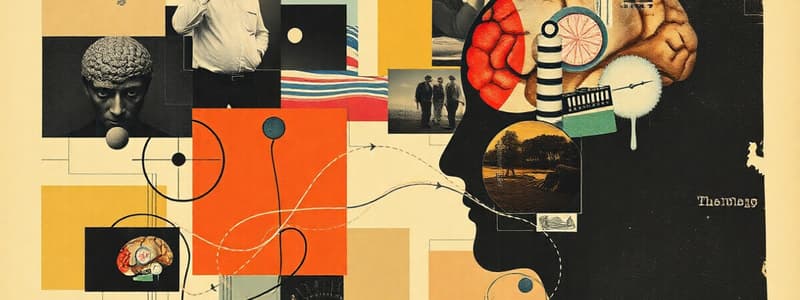Podcast
Questions and Answers
What is a key characteristic of critical thinkers when evaluating information?
What is a key characteristic of critical thinkers when evaluating information?
- They trust all sources without scrutiny.
- They avoid asking questions about the information.
- They use logical reasoning and make inferences. (correct)
- They rely solely on anecdotal evidence.
Which type of sources qualifies as empirical evidence?
Which type of sources qualifies as empirical evidence?
- Personal blogs and opinions.
- Television entertainment programs.
- Psychology textbooks and scientific journals. (correct)
- Social media posts.
Who set up the first psychology laboratory in 1879?
Who set up the first psychology laboratory in 1879?
- Sigmund Freud
- Wilhelm Wundt (correct)
- John Watson
- Edward Titchener
What method is associated with structuralism?
What method is associated with structuralism?
What limitation did structuralism face?
What limitation did structuralism face?
What was the aim of Titchener's structuralism?
What was the aim of Titchener's structuralism?
How do critical thinkers respond to information that sounds inconsistent or illogical?
How do critical thinkers respond to information that sounds inconsistent or illogical?
What does psychology primarily explore according to its definition?
What does psychology primarily explore according to its definition?
What is considered the most important aspect of psychology's definition?
What is considered the most important aspect of psychology's definition?
Which of the following is considered a pseudopsychology?
Which of the following is considered a pseudopsychology?
What is the primary focus of critical thinking in psychology?
What is the primary focus of critical thinking in psychology?
Which quality is NOT associated with critical thinkers?
Which quality is NOT associated with critical thinkers?
What does empirical evidence refer to?
What does empirical evidence refer to?
Which statement about critical thinkers is true?
Which statement about critical thinkers is true?
What should critical thinkers be cautious about?
What should critical thinkers be cautious about?
What is a common misconception about psychology?
What is a common misconception about psychology?
Flashcards
What is Psychology?
What is Psychology?
The scientific study of behavior and mental processes.
What are pseudopsychologies?
What are pseudopsychologies?
Observations about human behavior that lack scientific support. Examples include psychics, astrology, and palm reading.
What is critical thinking?
What is critical thinking?
The ability to analyze information accurately and draw rational conclusions based on evidence.
What is one characteristic of a critical thinker?
What is one characteristic of a critical thinker?
Signup and view all the flashcards
What is another characteristic of a critical thinker?
What is another characteristic of a critical thinker?
Signup and view all the flashcards
What is another characteristic of a critical thinker?
What is another characteristic of a critical thinker?
Signup and view all the flashcards
What is another characteristic of a critical thinker?
What is another characteristic of a critical thinker?
Signup and view all the flashcards
What is another characteristic of a critical thinker?
What is another characteristic of a critical thinker?
Signup and view all the flashcards
Critical thinking
Critical thinking
Signup and view all the flashcards
Empirical evidence
Empirical evidence
Signup and view all the flashcards
Structuralism
Structuralism
Signup and view all the flashcards
Introspection
Introspection
Signup and view all the flashcards
Functionalism
Functionalism
Signup and view all the flashcards
Wundt's lab
Wundt's lab
Signup and view all the flashcards
Principles of Physiological Psychology
Principles of Physiological Psychology
Signup and view all the flashcards
Edward Titchener
Edward Titchener
Signup and view all the flashcards
Study Notes
Introduction to Psychology
- Psychology is the scientific study of behavior and mental processes.
- A key aspect of psychology is the scientific method.
- Pseudopsychologies are observations about human behavior without scientific support.
What is Psychology?
- Psychology is about critical thinking, the ability to analyze information and draw rational conclusions.
- Critical thinkers are flexible, tolerate ambiguity, and identify biases.
- They are skeptical, basing claims on objective evidence.
- Critical thinkers avoid oversimplification, recognizing the complexity of human behavior.
- Critical thinkers are logical and inferential.
Critical Thinking
- Critical thinkers separate facts from opinions, and consider evidence quality.
- They use empirical evidence, obtained from experiments, observation, or measurement.
- They avoid "argument by anecdote" (personal stories as evidence.)
- They avoid oversimplification, and consider the complexity of the subject matter.
The Beginnings of Psychology
- Psychology has existed since the beginning of time in a general sense.
- Psychology as a formal discipline began in 1879 with Wilhelm Wundt's psychology laboratory in Germany.
- Wilhelm Wundt trained some of the first scientific psychologists
- Wundt wrote the important book "Principles of Physiological Psychology"
- Early psychologists were primarily interested in visual and auditory sensations, and feelings
- Edward Titchener was a student of Wundt in Germany.
Structuralism
- Titchener developed structuralism, an approach to psychology.
- Structuralism aimed to identify basic building blocks of human experience (sensation, perception, emotion).
- The method used was introspection (looking inward).
Functionalism
- Introspection limitations gave rise to functionalism (studying how the mind adapts).
- William James is considered crucial in developing and explaining functionalism.
- Functionalism broadened the scope of psychology, considering observable behaviors and emotions.
- Functionalism also influenced modern psychological testing and the modern education and industry methods.
Sources of Empirical Information
- Psychology textbooks are a source of empirical information.
- Scientific journals/periodicals, such as non-scientific sources like newspapers, television, websites or Wikipedia, can also provide information.
- Anecdotes, opinions of non-experts, should also not be used as evidence or factual information.
Studying That Suits You
Use AI to generate personalized quizzes and flashcards to suit your learning preferences.




